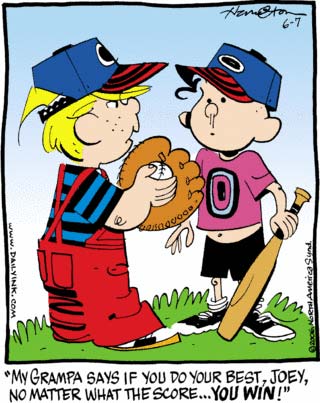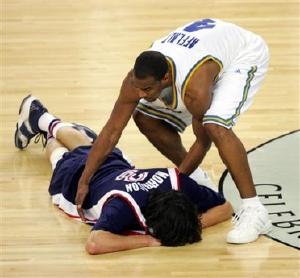
"No fair!"
"You cheated!"
"It wasn't my fault we lost!"
Have you ever played on a team with somebody who hated to lose? Or maybe you have a tough time if you lose anything — even a game of ping pong. Such omnipresent multimedia messages combined with a "winning is everything" philosophy embraced by increasing numbers of parents and coaches - makes it harder than ever for adults to teach kids that it's not whether you win or lose, but how you play the game that's important. Some kids find it extra-hard to lose, but everyone needs to learn how to do it. Learning to lose without losing your cool is a skill, like learning to ride a bike. You might not be able to do it at first, but over time it will get easier. And when you can handle losing, people will call you a good sport.
Why Learn to Lose Gracefully?
Everyone wants to win. But any time two teams or kids are facing each other in a game or contest, someone will lose (unless it's a tie). Kids lose in small ways, like in a game of checkers, but they also might face losing in bigger ways, like when their team loses a championship game. Losing is disappointing, so it's not surprising that kids don't like it. Adults don't like it either.
I can remember just four years ago how competitive and caught up in my flag football games I would get. I got so caught up that many of the female team members (it was a coed team) stated that they didn't want to play on the same team as I ever again or they didn't want to play anymore altogether because of my conduct when we would lose. I never was able to (until recently) grasp and learn to lose without losing my cool. Everyone can learn to control how they react to a loss. In other words, what should you do when you lose?

In addition, it's not surprising that the rise in bad sportsmanship -- and outrageous behavior in professional sports has resulted in a parallel increase of poor sportsmanship (e.g., trash-talking, violence) in youth sports. Regardless of whether we caution our kids to NOT idolize professional athletes who behave badly, kids will continue to be influenced by the behavior of the pros.
How can you instill in your child the importance of good sportsmanship and offset the "win at all costs" philosophy? Both parents and coaches can start by focusing on these issues:
Tips for Parents
# Be Your Child's Role Model. Offer praise and encouraging words for all athletes, including your child's opponents. Never openly berate, tease, or demean any child athlete, coach, or referee while attending a sporting event. When attending athletic events or watching them on TV with your child, refrain from criticizing or condemning athletes' performances.
# Do You Have A Hidden Agenda? Be honest with yourself about why you want your child to play organized sports. What do you want them to gain from the experience? Are your intentions based on providing them with pleasurable, social activities that develop a better sense of self-worth, skills, and sportsmanship? Or do you harbor dreams of them turning their topspin forehand into a collegiate scholarship, or riches and fame? A child's participation in sports and the importance attached to it should not be driven by a parent's desire to use their child's sports accomplishments for ulterior purposes.
# You Set the Rules. It's ultimately your responsibility to teach your children good sportsmanship, both as a participant and as a spectator. If you observe your child engaged in poor sportsmanship, regardless of whether their coach corrects them or not, you must discuss your child's misbehavior and insensitivity with them after the game. If a coach is ignoring, allowing, or encouraging poor sportsmanship, you need to make your objections known to the coach in a private discussion.
# Watching and Learning. Whether you're watching the Olympics on TV or attending a high-school sporting event, you can always find "teachable moments" regarding sportsmanship. Ask your child their opinions of: players who showboat and taunt their opponents; the costs to the team of a technical foul, or being ejected from a game for unsportsman-like conduct; and the appropriate behavior of opposing players toward one another after a game. During these "teachable moments" ask them open-ended questions and listen more than you talk or lecture.
Tips for Coaches
Coaches nurture good sportsmanship. They should embody parents' values regarding good sportsmanship. A coach must model good sportsmanship at every level and make it a core goal of his work with kids.
I recommend that every youth sports coach engage their players in a detailed discussion of good sportsmanship as soon as they forms their team. A written contract, perhaps titled The Good Sportsmanship Code, should be given to every child and parent to sign. The contract should spell out what the coach expects from each player in terms of good sportsmanship, including the following areas:
* Cheating
* Losing one's temper
* Negative criticism of teammates, coaches, referees, and opposing players
* Blaming teammates for mistakes or a poor team performance
* "Trash talk" and taunting opponents
* Showboating
* Arguing referees' calls and judgments
* The need to congratulate one's opponents after a game
Coaching children is an honor and a privilege that carries with it a moral responsibility to contribute to the healthy character development of young players. Coaches who equate "trying your best" as the definition of success -- and who value, expect, and demand good sportsmanship from their players -- help shape the moral, ethical, and spiritual character of children.
Communicate often with your child's coach to make sure they takes this responsibility seriously.
Here are some ways that your child can show others what good sportsmanship is all about:

1. Be polite to everyone you're playing with and against. No trash talk — which means saying mean things while you're in the middle of a game.
2. Don't show off. Just play your best. If you're good, people will notice.
3. Tell your opponents "good game!" whether you've won or you've lost.
4. Learn the rules of the game. Show up for practices and games on time — even if you're the star of the team.
5. Listen to your coaches and follow their directions about playing.
6. Don't argue with an official if you don't agree with his or her call. If you don't understand a certain call, wait until after the game to ask your coach or the official to explain it to you.
7. Don't make up excuses or blame a teammate when you lose. Try to learn from what happened.
8. Be willing to sit out so other team members can get in the game — even if you think you're a better player.
9. Play fair and don't cheat.
10. Cheer for your teammates even if the score is 1,000 to 1! You could inspire a big comeback!


Reference: FamilyEducation.com
Personal Trainer in Charlotte, NC
.jpg)



No comments:
Post a Comment